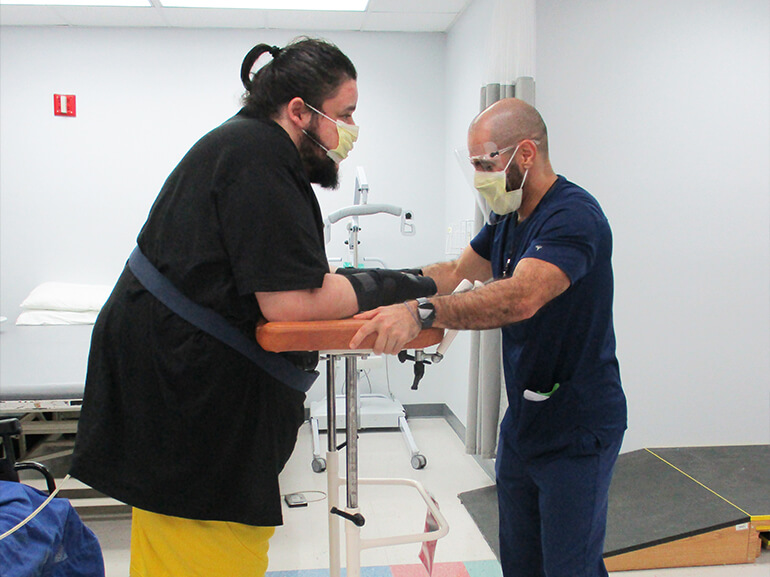Carlos' story

Carlos Caiaffa, 43, is a father of three who previously worked in insurance claims. He was enjoying a busy life with his fiancé and children when he began to experience shortness of breath. Carlos drove himself to the emergency room at Jackson Memorial Hospital in Miami and shortly after arrival, fell unconscious due to acute respiratory failure. He was immediately intubated for nearly five weeks and required a tracheostomy, a surgically created opening through the neck into the trachea (windpipe) to allow direct access to a breathing tube. As his tracheostomy was being created, Carlos experienced complications that caused him to lose a significant amount of blood.
When he awoke over a month later, Carlos was unable to speak or stand and was experiencing severe polyneuropathy, or the simultaneous malfunction of peripheral nerves throughout the body. He had also developed a stage IV sacral ulcer from being immobile in bed for so long. After Carlos was stable enough to be transferred, he was discharged to an inpatient rehabilitation facility but within 24 hours, Carlos was diagnosed with sepsis, a life-threatening condition that arises when the body's response to infection causes injury to its own tissues and organs. He was transferred back to Jackson Memorial Hospital where he underwent multiple blood transfusions. Once he was re-stabilized, Carlos was admitted to West Gables Rehabilitation Hospital. He said that he chose West Gables after reading reviews about the caring and helpful therapists and good outcomes.
Upon admission, Carlos’ upper extremities were virtually immobile from the polyneuropathy and his lower extremities were so weak from muscle loss that they were unable to support the weight of his body. Carlos’ nurses worked to heal his sacral wound with proper care and diet while his physical and occupational therapy team worked to help Carlos painstakingly regain function in his arms and legs. Occupational therapists utilized hand splints to assist him as he re-learned to perform personal care tasks. Because Carlos was so debilitated, his physical therapy team focused on basic strengthening exercises such as bridges, rolling on his sides and sitting up in bed.
As pushed through challenging therapy sessions as well as physical and mental pain, Carlos found himself experiencing moments of darkness and low motivation. This all changed one Sunday when the staff arranged to have Carlos’ three-year old daughter come for a visit. Holding and playing with his daughter provided the spark of motivation he needed to continue his rehabilitation journey with strength. Carlos regained focus on his main goal – to recover as much mobility and function as possible in order to be the best father and partner possible.
Carlos and his therapy team hit the ground running. Physical therapists began to utilize a piece of equipment that helped Carlos more easily move from sitting to standing. At first, using the sit-to-stand equipment required the help of multiple therapists and aides, but each day, Carlos made it his goal to for a longer duration with less assistance each time. Therapists worked with him on standing up straight, lifting one leg at a time while standing and later, and standing without assistance to practice his balance. As his strength and endurance improved, Carlos was able to walk 70 feet using assistive equipment.
Part of Carlos' therapy journey also included working with recreational therapists to learn about resources available to him and his family as he prepared to return home. As part of his sessions, he used his upper extremities to create art. Carlos also leaned on humor and music as a way to aid in his healing process.
By the time Carlos was ready to be discharged, both he and his care team were thrilled with his progress. Not only did Carlos exceed his own expectations, but the expectations of his former physician as well. His illness and rehabilitation experience caused Carlos' outlook on life to change significantly, saying that he finds himself so incredibly grateful for the function he has, his family and his nursing and therapy staff at West Gables Rehabilitation Hospital. He refers to his therapy team as "real life angels" and believes that he was truly meant to end up in the hands of the West Gables team who provided him with smiles, laughs, support and positive energy that helped him to push past the pain.
Carlos' advice for anyone facing rehabilitation after a serious health crisis is “no matter how dark your days are or how much you think you can't regain function, believe in your therapists and you will get back to where you need to be.”